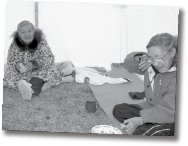
An oral history project is an opportunity to develop the skills needed to work as a team. Team skills are necessary in the job market, as well as valuable in day-to-day life. The number of people on a team depends on the total size of your group and the scope of their work. But four can be a productive number for a working team. Small groups often need some practice working together before they start work as a project team.
Small groups can decide on roles or tasks for their members to carry out. Some people may be good at certain tasks and want to focus on those tasks only. But it’s important to encourage people to stretch themselves and try things that don’t come so easily to them – start small and encourage people to gradually increase their responsibilities. It is also important to keep the group members’ literacy skills and needs in mind. People with stronger literacy skills shouldn’t expect to do all the reading and writing tasks; they can work with those with weaker literacy skills to build the capacity of the whole group. Everyone in the group should be familiar with all the tasks: looking after the files, operating the equipment, contacting the storyteller, and so on. That way the interviews can still take place if one group member is unexpectedly absent.
